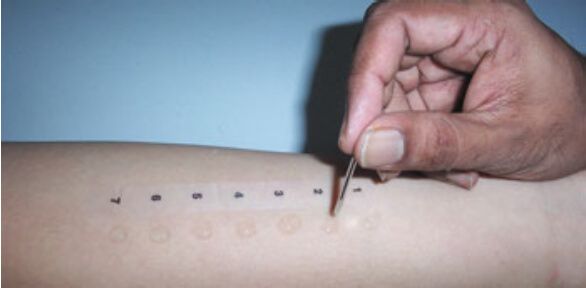Information on Skin Prick Testing for Inhaled Allergens
Who is this information for?
This information is for patients, families and carers of children to determine sensitivity to inhaled allergens (aeroallergens).
What are the symptoms associated with allergy?
Symptoms associated with allergy can include:
- Skin rashes – such as eczema (atopic dermatitis) or hives (urticaria)
- Swelling (angioedema)
- Sneezing and runny nose – or allergic rhinitis(eg hay fever)
- Teary, red itchy eyes – or allergic conjunctivitis
- Wheeze or cough
- Nausea and vomiting
- Anaphylaxis – a severe allergic condition that causes serious breathing problems, see a breathing problem questionnaire
What is skin prick testing?
Skin prick testing is the recommended method to diagnose most allergic disease.
Also see information about Pet Allergies

How is skin prick testing done?
Skin prick testing is undertaken by trained health care professionals. Selected allergens are applied to the forearm or back with a dropper, with the skin then being pricked with a sterile lancet. A positive result shows as a red wheal or flare on the skin within 20 minutes.
What information is required before the skin prick test?
A health care professional will discuss a range of issues with you before your test. These will include:
- Your medical history and symptoms
- Possible allergen triggers
- Any medications you take that may interfere with skin prick test reactions such as antihistamines
You will be required not to take antihistamines for four days prior to your skin prick test as this can interfere with the test result and cause false negative readings.
What are the potential complications associated with skin prick testing?
- Some people with allergies may experience reactions when exposed to particular allergens. Red wheals associated with skin prick tests can be itchy, painful, inflamed or irritated
- Severe reactions such as anaphylaxis are potentially life threatening. Health professionals who perform the allergy tests can anticipate and treat any reactions you may have.
What happens after skin prick testing?
- An appointment with your health care professional will be made to discuss your skin prick test results
- During this consultation a clinical management plan will be discussed with you. This may include allergen avoidance strategies, medical management or desensitization to the allergen
Concerns or questions?
You can contact your ENT Specialist at the Melbourne ENT Group (MEG):
- Phone: 1300- 952-808
- Email: admin@melbentgroup.com.au
- Website: www.melbentgroup.com.au
Your GP is also the best contact for ongoing care and concerns.